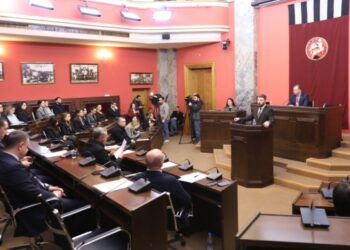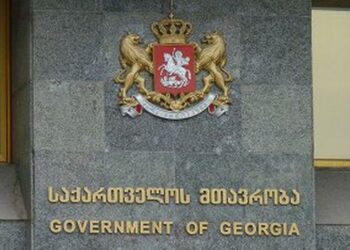In the past, we have devoted several publications to the functional and structural reorganization of the Georgian foreign affairs agency. This is one big topic, the importance of which goes far beyond diplomacy and is directly and immediately related to ensuring the country’s effective national security and reputation.
This time we want to discuss only those characteristics that we consider appropriate in the development and implementation of Georgia’s foreign policy. We would like to add that such appropriateness does not fall only into the frame of “want or don’t want”. The point is that it is dictated by the very modern realities that we briefly discussed at the beginning of the article (see last week’s issue of GT).
Flexibility and adaptability needed to adapt Georgia’s foreign policy to regional or global challenges
We have already mentioned the excessively transactional nature of international relations. The most important characteristic of this approach, as in business, is to make a concrete decision on a concrete issue taking into account the so-called “costs and benefits”. At the same time, it is equally possible that such a decision could change as a result of a change in the views of a political leadership or their expectations of diplomacy.
We should remember and know this and should not be surprised. Moreover, the Georgian approach should be based on the same principle, which includes a correct reading of “our” and “their” practical needs and a mutually beneficial overlap. This is the handwriting suggested by the egoistic environment around us, in which necessity and practicality dominate over futile idealism and useless romanticism.
Real Opportunities Policy
What is known in political science as realism, for us it is the politics of seeking and exploiting real opportunities.
Such a policy requires a rational perception of the regional or global contradictions around us and, as a result of the proper management of such contradictions, manifests itself in practical results useful to us. In other words, the existing contradictions should not alarm us, should not frighten us. On the contrary, we should use them as an opportunity to realize our interests through their mutual balancing and opposition.
At the same time, in order to identify realistic policy opportunities, we believe it is organically necessary to:
“Desentimentalize” the immediate process of foreign policy making, whether covert or public
In other words, practical results require practical and sometimes unpopular methods and steps. Their only justification and measure is a tangible result, and the biggest obstacle to such a result is our own stereotypes or archetypes. We believe it is mandatory to get and understand the stereotypes or archetypes of the other side (regardless of whether it is a friend or an enemy). We talked about this in detail when, while discussing the forms of actual Georgian diplomacy, we considered the so-called diplomacy of empathy.
Since we have mentioned the stereotypical vision, let us express some opinions about those aspects that have a significant impact on the foreign policy of our allies and partners today, and if they are not taken into account, Georgia’s foreign policy vector will lose its much needed practicality. In particular, we are talking about the fact that:
The foreign policy of the current stage has come under particular pressure from the domestic political conjuncture
The process of principal foreign policy decisions is practically governed by the mood of the electorate of a particular country and, accordingly, by the need for power. Moreover, in many countries of interest to us, the substantive side of the process has shifted from populism to radicalism, and from ethno-nationalism almost to extremism.
Since we have mentioned the dominance of nationalism in foreign (and not only) political handwriting, it is impossible not to mention the “rationales” that are sometimes skillfully and sometimes not so skillfully used by practicing politicians:
(a) an emotional element manifested in national unity and civic mobilization in making and implementing controversial decisions;
(b) a political element indicating a high willingness to address the existing problem; and
(c) an element of policy-making itself that helps maximize state opportunities and multiply resources.
We believe that by reasonably gathering and incorporating these elements into Georgia’s political line, we must have a realistic expectation that the other side will also utilize them.
Adaptation to the balance of power and timely readjustment when it changes
The global balance of power between geopolitical centers requires constant professional observation and impartial, unbiased assessment. Here too, the manipulation of propaganda clichés and outdated stereotypes aimed at one’s own constituents or external audiences should be a thing of the past.
At the same time, regardless of whatever shift in the balance of power, we believe that the Georgian foreign policy will still have clear priorities in the near and mid-term future as a constant:
(a) continuous development of bilateral relations with the U.S. as a strategic ally to introduce new opportunities and new formats of cooperation;
(b) “export” of European political culture and values to Georgian reality and integration into political Europe through real actions;
(c) an established working relationship with China, subject to the necessary predictability of its results;
(d) managing relations with Russia, whether in an anti-crisis, crisis or post-crisis situation.
It is also clear that however great and sincere our desire to master the creation of such a political line, it must be based on at least two basic premises, namely: (1) an economically self-sufficient national system and (2) the deparatization and “disintoxication” of foreign policy by infusing it with intellectual content, meritocracy, and competence.
The region factor in the big foreign policy picture
We have already talked about the role and significance of regional processes in the wide format of Georgia’s foreign policy. There would probably be no need to mention this aspect again if it were not for the complex knot of South Caucasian geopolitical and geo-economic interests.
At the same time, it is precisely this complex regional background that gives us a unique opportunity to assert our role in the South Caucasus as an integral part of the wider Black Sea region, which will contribute to the competitiveness and capacity of the Georgian state, i.e. its functionality and effectiveness. The realization of this in Georgian politics has been taking place already in the 1990s and has been reflected in practical solutions. However, the achievements of the past are no longer sufficient today, and they will be completely nullified tomorrow if we do not constantly act to update this function.
To use a famous phrase of a famous politician, our task should be to become an “indispensable nation” in a wide region which means that the country should become not only one of the hubs of transport routes, but also a center of knowledge about the region for the rest of the world, a “soft power” in terms of disseminating best practices and standards, a diplomatic arbiter or mediator to resolve conflicting interests. It is to this task (and not to the misunderstanding we see) that the national energy and corresponding material resources should be directed. This work should have been started yesterday, so that tomorrow it would not be futile.
Therefore, the redistribution of power at the junctures of West and East or North and South on a global scale is still an ongoing process and will continue until the world international system finds a new “balance point.”
Given the existing difficulties and high degree of unpredictability, the foreign policy of our country should clearly outline conceptually its own, so-called “Georgian Path”.
In transforming the views and recommendations expressed in this article into practical solutions and actions, it is the conceptually renewed approach that should sensibly and comprehensively address global and regional contradictions. Moreover, with their qualified understanding (and, obviously, the growing institutionalization of the Western vector in the internal and external lines) and the support of the modern political (non-existent?) elite, Georgian public diplomacy should assert its multi-priority in external positioning. It is a fact that the country is faced with a demand for the creation of a new type and spirit of politics, which, among other things, requires radical personnel, structural and functional reorganization of the country’s foreign policy agency. Without fulfilling this demand, the modernization of the Georgian state in a democratic regime will remain an unfulfilled Georgian dream for a long time to come.
Analysis by Victor Kipiani, Geocase Chairman














